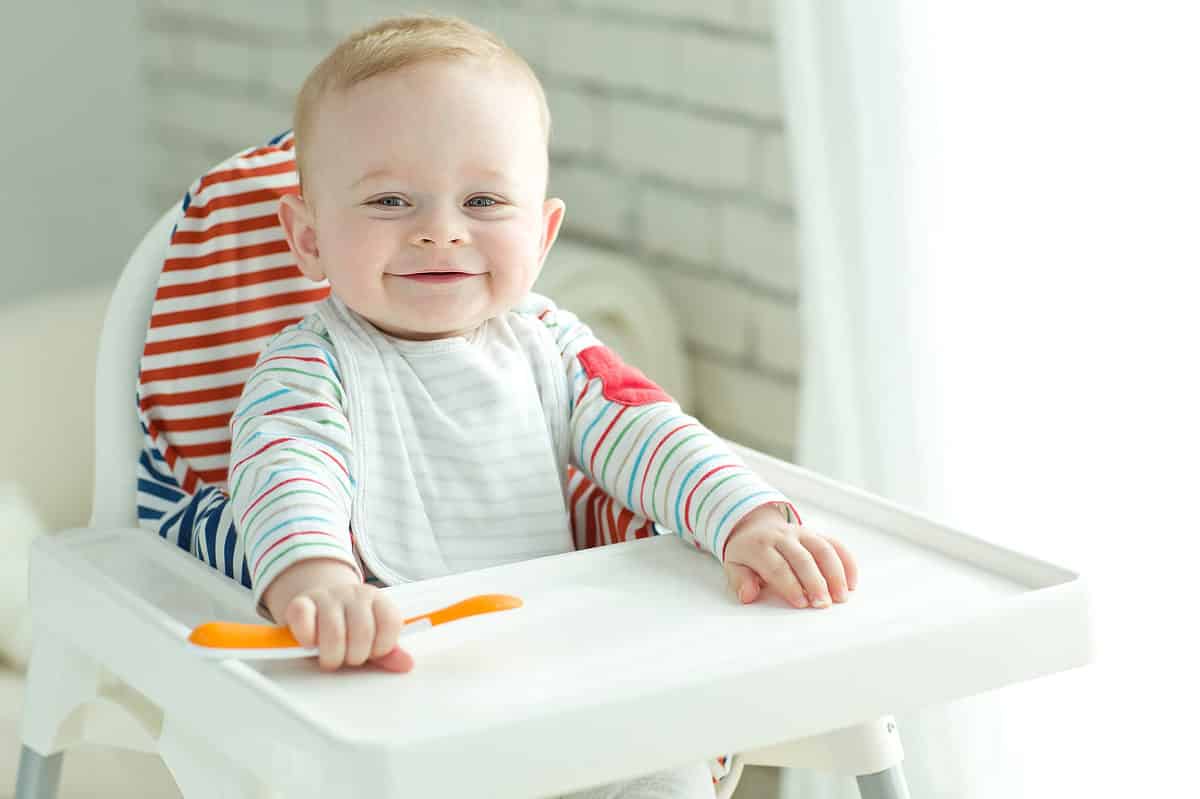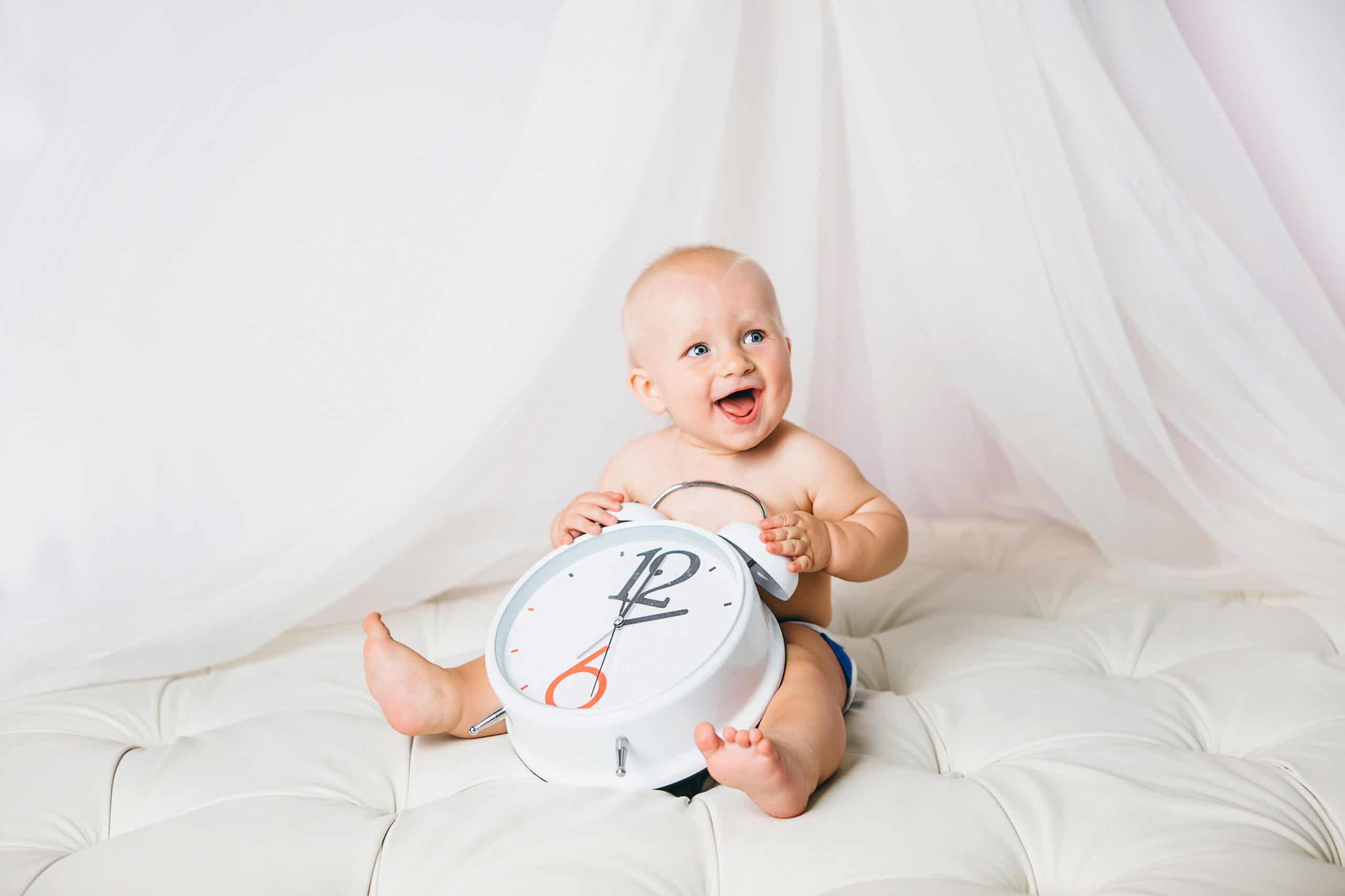Wow! The time has really flown by, and now your baby is already six months old! It is during this month that you are really going to see your child thrive. This is the time when you will watch your baby hit some major strides, including learning small movements, picking up objects, and finding ways to communicate like never before. There is a lot to look forward to this month, so let’s jump into the developmental milestones at six months of age.
Key Points
- If you haven't started feeding your baby solid food by now, you'll want to start.
- Your baby will begin sleeping for around ten hours at a time during the night, and take roughly three to four naps during the day.
- Your six-month-old should begin recognizing people and trying to communicate.
Six-Month Eating Habits
At this part of their life, your baby will be able to control themselves more when it comes to feeding. If you haven’t started feeding your baby solids yet, then you can begin doing so by 6 months.

By 6 months, your baby will be able to sit up and open their mouth when food is offered.
©Nina Buday/Shutterstock.com
It is at this age that your baby should start having the ability to sit up in their high chair, keep good head control, bring objects to their own mouth or know to open their mouth when food is offered, and move the food around in their mouth and be able to swallow.
When it comes to feeding your baby at six months, consider starting by introducing vegetables, pureed fruits, and some meat. Many parents also find that their child prefers infant cereal as their first food.
Remember that even though this is the age when your child will be able to understand these eating methods, you should still take it slow. Start with a half spoonful of food or less. If your baby cries when you try to feed them, then don’t despair. Wait another week and try again.
Also, it is wise to only try to feed them one single-ingredient or food at a time and stick with it for three to five days. This is a good way to determine if they have any food allergies. Monitor your child closely when you introduce new foods; if they have an allergic reaction, then you'll want to address it as soon as possible.
You should also be on the lookout for signs of choking. Although the foods your child will eat at this age are very soft, that doesn't mean they're immune to choking. To help prevent choking, feed your child slowly and wait until they've completely swallowed before giving them another spoonful. Make sure they're sitting totally upright, and that they don't lie down while they have anything in their mouth.
Six-Month Sleeping Habits

Your baby will start to break up their nap times starting at age 6 months.
©Leka Sergeeva/Shutterstock.com
As your baby approaches six months, they will still sleep for about ten hours at night and then take three to four hours worth of naps during the day. Within the sixth month, you may find that your baby is sleeping less during the day. That typically happens because they are so excited about the new talents they are learning that they find it hard to sleep.
It is at this age that your baby may also sleep ten hours at night but then break up the day into two or three naps during daylight. In any case, they should still be sleeping 12-16 hours for every 24-hour period.
Miscellaneous Milestones At Six Months
This is truly an exciting time for a growing baby as they will begin to learn numerous new skills and experience various milestones, including:
Reacting To Your Emotions
Although it will be at a very basic level, babies at six months will start to become a bit more in touch with their emotions. Mostly, they will react to your emotions. So, if you are happy and smiling, they may tease a smile as well. If you are crying, then they may mirror that feeling by letting out a whine of their own. Babies are surprisingly in-tune with the emotions of those around them, so it shouldn't be a surprise to start seeing your child reflecting your own mood!
More Exploring
At this age, your baby will be more intrigued by the world around them. This is the time when you will see them reaching for more things, looking at items with more interest, and trying to put many objects in their mouths as a way of understanding the world and learning about tastes and textures. Knowing this, make sure that you keep all loose and small items out of reach, even if you think your baby can’t get to them.
Recognizing People
Your baby is truly growing at this age to the extent that they won’t see all people as strangers. Instead, you will often see the look of recognition in their eyes when you or someone else they have seen before walks into the room. Your child will also enjoy looking at themselves in the mirror while getting a kick out of what they see. If they are with someone unfamiliar, they may become uneasy or show other basic signs of recognition that this person is a stranger.
Communication Skills Will Evolve
One of the most exciting developmental milestones at six months of age is the fact that your baby will be able to start vocalizing their thoughts better than they have previously. At this point, you will hear your child babbling more than they have before, and they may even say simple words like “mama.” This is also a precious time because if they know their name, they may start responding with a facial expression when they hear it.
They Will Play More
At this age, your six-month-old will now be more engaged in playing with mommy and daddy than they were before. Playing the standard games like patty-cake and peekaboo will keep your baby engaged and help them to further hone their motor skills. Along with those skills, your child will also get better with hand coordination, and you will start to see them passing objects from one hand to another.
Build the Muscles Necessary to Sit Up
Another of the exciting developmental milestones at six months of age is that your baby has begun to develop the neck and core muscles necessary to sit up and keep their head still. It is too early for them to get up on their own, but if you position them with their back to a pillow for extra support, then you will see that they are able to stay sitting up. It is one of the reasons why they are able to sit up in the high chair.
Making Crawling Motions
While most babies will be unable to crawl at six months, it is at this time that they will start to develop the motions necessary to do so. It is at this point where you will see them try to get up on all fours, and if they can, they will rock back and forth in preparation for the big moment.
Rolling Over
While they may not yet be able to crawl, at six months, your baby should be able to roll over from side to side. At this point, your baby should have been able to roll from their stomach to their back, and now they should be able to roll from their back to their stomach. With your baby now more mobile, it is extra important to keep loose items away and to not put your child on high surfaces.
Six-Month Weight And Length Averages
Your baby will grow quickly and gain a decent amount of weight during their first five months of life. At 6 months, you will see that their growth rate will slow down a bit. That is mostly because your baby will start to be more active at this point, so they will burn more calories. But just because they are not gaining weight at the same rate, it doesn’t mean that they are not perfectly healthy. Below are the averages of height and length at 6 months:
| Boys | Girls | |
|---|---|---|
| Average weight | 17 pounds 7 ounces | 16 pounds 2 ounces |
| Average length | 26 1/2 inches | 26 inches |
What Parents Should Watch Out for at Six Months

Your baby should be able to show signs of smiling or laughing by age 6 months.
©ANNA GRANT/Shutterstock.com
With so many amazing developmental milestones at six months old, there is a lot for parents to be excited about. However, it is also important to be aware if your child is not displaying the attributes below. If they aren’t, then you may want to contact a pediatrician.
Be cautions if your child:
- Does not respond to nearby sounds.
- Does not show affection to caregivers or parents.
- Doesn’t laugh or smile.
- Doesn’t make vowel sounds.
- Struggles to get food into his mouth.
- Can’t roll over in any direction.
- Doesn’t try to grab nearby objects.
- Seems too floppy and cannot remain sitting up.
What Will Come Next?
Now that your child is six months old, you might be looking ahead to their development at seven months. There's even more exciting milestones that your child will experience at seven months! Their growth is going to continue at a steady pace, which will be very exciting for you!
Your baby will continue consolidating their sleep; you should start to notice that they're sleeping more consistently throughout the night on a regular basis. In addition, they may start taking fewer naps during the day. Your baby might start responding to their own name, which will be an exciting moment for you! It's a good idea to use their name as often as possible at this age.
Further, your baby will continue building on the skills they developed at six months. They'll be able to sit up without support, and you'll probably see them rolling, creeping, or crawling around! They'll continue to become more social; you'll see them babble at others and seek interaction. Your child will begin making vowel sounds at this age.
Conclusion
So, now you know the developmental milestones at six months of age. Remember to feed your child appropriately and play whenever you can at this age to ensure their good health going forward. If you have any concerns about their development, make sure to speak to their pediatrician.
The image featured at the top of this post is ©Kokulina/Shutterstock.com
